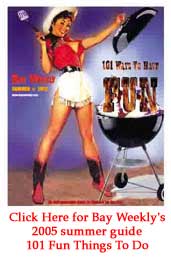|
|
 |
||
|
Volume 13, Issue 24 ~ June 16 - 22, 2005
|
|||
Brother Elmer, the Piano Man, used a rousing rhythmic fusion of ragtime and barrelhouse piano styles to deliver messages of the spirit. by Russ Barnes Chesapeake Country has lost an irreplaceable gospel musician. On May 22nd, Elmer Elijah Mackall, 81, church piano player and singer, died at his home in Prince Frederick. For 70 years, Methodist churches around the region wooed Brother Elmer, also known as the Piano Man, to energize their services. He accompanied himself and other singers using a rousing rhythmic fusion of ragtime and barrelhouse piano styles to deliver messages of the spirit. His singing — ranging from a craggy tenor to a clear falsetto — moved worshipers along the Western Shore of the Chesapeake to experience a world beyond the tobacco fields in which many of them labored. In the Maryland churches in which Mackall played — including Mt. Hope United Methodist Church, Mt. Zion United Methodist Church and St. Edmunds Methodist Church — gospel music is much more than background. As in Brother Elmer’s practice, it is a community performance to support personal survival, create solidarity and inspire listeners with the joy of life that outbalances adversity. Much of this Chesapeake gospel music has roots in West Africa and the Caribbean Islands from which slaves were brought to America. For centuries the music has flourished in this region. When you enter an African American church, you are struck by the humorous, encouraging chatter and the dressy hats of the ladies. When the piano man begins to play his assertive, stirring chords and the hand clapping begins, everyday fears somehow fade. Horace Boyer, professor emeritus at the University of Massachusetts and editor of Lift Every Book and Sing: An African-American Hymnal, listened to a CD of Mackall’s songs. He concluded that Maryland gospel music is unique in that the music expresses a special freedom and exultation. “The Maryland experience, more than other regions,” he says, “embraces pain and tribulation as a catharsis that leads to liberation.” Gospel music like Mackall’s is at once as tough-minded and as tender-hearted as the Gospel itself. When I met Mackall in his Prince Frederick home in 2003, he was already in a wheelchair. He greeted me with warm hospitality. It was clear in our one meeting that he was checking me out for my trueness to reality, my discipline, my realness. All that, he seemed to convey, is what religion is about. This is what you do in church. It’s not about dogma or doing good. It’s about a person — you, me, everyone — who faces hardship and who must draw upon the resources given us. Mackall defined his spiritual principles over seven decades in Calvert County. Born in 1923 into a tobacco sharecropping family of 17 children, he taught himself piano and was playing in church at age 10, accompanying the singing of his talented, extended family. “Mama sang like a mockingbird,” he told me. Later, to sustain his own family, he worked as an oyster shucker and a tobacco farmer. “He supported his family,” says Thelma Claggett, his daughter who was his primary caretaker in recent days. “He inspired church-goers all over our county,” she reported. Often Mackall’s music is about work: Hark the voice of Jesus calling Who will go and work today? Fields are ripe and harvests waiting Who will bear my sheaves away? —“There’s a Bright Side Somewhere” It was a hot afternoon in June when I arrived at Brother Elmer’s door. An upright piano stood against the living room wall. He rolled his chair up to the piano — and the good times began to roll. His hands strode up and down the black and white keys. His head shot back and rocked from side to side as he sang of hardship -— and an unexplainable deliverance from it all. After a few songs, Mackall asked me to make a request. I asked for “How I Got Over,” one of my favorites. The music and the words came out breathtakingly fast from the immense musical database of his brain and fingers. At one point, he insisted that, if he were to continue singing, I was required to sing along. Expressing my feelings so openly was difficult. I began to sweat. He stopped playing. “Come on,” he said. “You can do it.” The words came out and I sang along with the master: Just as soon as my feet strike Zion Going to lay down my heavy burden Try on my golden slippers I’m going to shout and tell God’s story And then I’ll sing, “Hallelujah.” I’m going to shout, “Trouble is over.” I want to sing Hallelujah, after a while. “We have to get right while we’re here on earth,” he told me. Some of the other songs Mackall sang that day are now out on CD, A Bright Side Somewhere. The CD also includes Mackall’s versions of “Eye Up on High,” “Just a Closer Walk with Thee” and “Jesus Met the Woman at the Well.” Order the Bright Side Somewhere CD from Thelma Claggett, 256 Fairground Rd., Prince Frederick, Maryland 20678: 410-535-5078. About the Author: About the Author |
|||
|
|
|||
|
© COPYRIGHT 2004 by New Bay Enterprises, Inc. All rights reserved.
|


